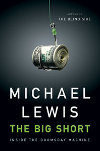Recommended night-time high-finance reading: “The Big Short” by Michael Lewis
I tore through Michael Lewis's The Big Short: Inside the Doomsday Machine over the weekend. In it, he tells the sorry tale of the subprime mortgage crisis that in 2007 brought low the major U.S. brokerage houses and banks, along with a certain ignominious insurance firm.
 As suggested by the title, Lewis narrates the subprime chronicle from the point of view of the few -- the very few -- who dared to bet against the shady mortgage bonds. (In finance terms, "short" means that you expect the price to fall, as opposed to the more conventional "long".) It takes a one-eyed near-autistic shut-in investor to deduce the problem -- mortgages were being sold to people that had no hope of repayment -- and also to figure out how to bet against bonds made up from these mortgages. Only a couple of garage-based amateurs and two big-time bond traders managed to hit on the same formula.
As suggested by the title, Lewis narrates the subprime chronicle from the point of view of the few -- the very few -- who dared to bet against the shady mortgage bonds. (In finance terms, "short" means that you expect the price to fall, as opposed to the more conventional "long".) It takes a one-eyed near-autistic shut-in investor to deduce the problem -- mortgages were being sold to people that had no hope of repayment -- and also to figure out how to bet against bonds made up from these mortgages. Only a couple of garage-based amateurs and two big-time bond traders managed to hit on the same formula.
Despite the intense pressure to abandon the carrying costs of these short bets, these few investors eventually did very well for themselves. Unfortunately, the big traders that lost billions for their firms and their customers also did very well for themselves, pocketing obscene bonuses just as the market caved in upon itself.
Lewis unfolds the story in a gentle descriptive account, suitable for any reader of intrigue, regardless of financial background. In fact, in all my years of following the subprime mishegas, his was the first explanation of credit default swaps (CDSs) and collateralized debt obligations (CDOs) that I fully grokked...after two re-readings. The more difficult concept to understand was how anyone thought these mortgages had any value whatsoever, regardless of the nearly risk-free rating assigned by the bamboozled credit rating agencies. That the mortgage resellers had a clause to cover homeowners that defaulted on their very first payment should've been a clue.
The book is also a strong indictment of derivatives, particularly the so-called synthetic derivatives that are money-multiplying side-bets made on securities; during the crisis, the money nearly multiplied itself beyond the total currency worth of the planet. So you can see the problem.
I'm now keen to try Lewis's first major book, Liar's Poker, which recounts both his heady days as a bond salesman for Salomon Brothers and the -- purely coincidental -- decline and fall of that same institution.

Archived Comments
Dave, how you doin' dude? Love the blog! If you want to grok CDSs, CDOs, etc, the must-read is Janet Tavakoli. Check out: http://www.huffingtonpost.com/janet-tavakoli or http://www.tavakolistructuredfinance.com/press.html She has been blowing the whistle on this stuff since 2003! The first page of the her 2003 book Collateralized Debt Obligations and Structured Finance calls out that they were already being used for fraud then: http://www.amazon.com/gp/product/0471462209?ie=UTF8&tag=tavakostructf-20&linkCode=xm2&camp=1789&creativeASIN=0471462209#reader_0471462209 No one started listening until just recently, of course. Another early, persistent and knowledgeable CDS critic is Chris Whalen: http://www.rcwhalen.com/articles.asp Cheers!
Thanks, Russell. Like everything in finance, the concepts behind CDSs and CDOs are pretty simple once you get past the terminology, but the way that they're actually used is mind-blowingly confustipated.